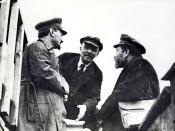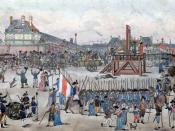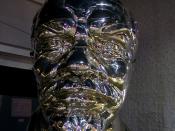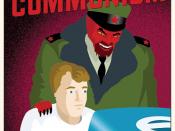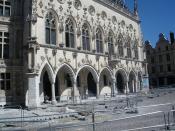Revolutionary Thought When the individuals that comprise the governing institution of a society no longer represent the common will of the people, [often] those whose interests are set aside come together and fight for what they believe they are due. And in extreme instances, when the conflict spans years, drastic change is called for often resulting in a bloody laborious struggle. From the crowd leaders emerge, the intelligent, the most powerful, and the ones who can get the job done. In two of history's more renowned revolutions, the French and Russian, two great thinkers pushed the revolution onward, Robespierre and Lenin, respectively.
Maximilien Robespierre was born on May 6, 1758, the son of a lawyer in Arras. His life was successful early on, being awarded a scholarship to the prestigious Louis-le-Grand College in Paris. Here he was prominent in his studies of philosophy and law, after which he became a lawyer then a judge.
As a lawyer he represented mainly poor people, and outraged the privileged classes when he protested against royal absolutism and arbitrary justice. Then the notice of the summoning of the Estates General came out the people of Arras elected him to represent them in the Third Estate. He became the leader of the Jacobins, the political group in favor of the Revolution, and later devoted himself to the National Assembly, the group responsible for the newly drawn constitution. He openly accepted the Declaration of the Rights of Man and the Citizen, the preamble to the constitution. He fought for universal suffrage, unrestricted admission to the National Guard and public offices. He opposed that which would restrict powers to fewer people, such as the royal veto and also opposed racial and religious discrimination. He worked in the National Convention and more specifically the Committee of Public Safety and its infamous Reign of Terror, that slaughtered anything standing in the way of revolutionary progress, eventually even he would fall victim to his own ideals.
Robespierre argues that the Roman/Greek concept of virtue is the "fundamental principle of the democratic or popular government" and this virtue comes from one's love of their country and of its laws. If the people of a society hold the common will as first priority, then the democratic nature of government falls into place and is not forced. When democracy and love hold precedence over greed, laws are adhered to voluntarily. He goes on to say that the "essence of the republic or of democracy is equality." Good society stems from these above principles. Good society is an equal society in which each member has the right to their say in government and has an equal opportunity in life, based on merit, not of Old Regime notions like birth. It is a society in which the love and respect of the country and its laws foster a peaceful country, and when change is called for it is done so in an orderly and democratic fashion.
Nikolai Lenin was born April 22, 1870 in a happy family of highly-educated and cultured parents. There was nothing extraordinary about his childhood that would indicate the future revolutionary he would become. He was exceptionally intelligent, graduating first from high school, particularly gifted in classical studies and at 16 he became an atheist. Two events lead to his revolutionary turn: first, the death of his father, who shortly before dying was threatened by the government that feared public education; second, the hanging of his brother for conspiring to assassinate Emperor Alexander III. After some political discussion surrounding Lenin and his desire to study law at Kazan University, he was allowed to go ahead with his studies and later practiced as a lawyer. While a lawyer he represented mainly the poorer classes, and he grew to hate the social bias of the legal system. He became active among distinguished Marxists thinkers who unified in the Union for the Struggle for the Liberation of the Working Classes, fighting under the slogan "All power to the Soviets!" [What is the Third Estate?, Sieyes] Lenin's Good Society is the anarchist communist society. Lenin says that democracy is not identical with majority rule, rather it is a "State, which recognizes the subjection of the minority to the majority." Here he points out that what people have come to accept as being democracy, majority rule, is merely a tool for suppression of the working class. Lenin takes this point further into the realm of capitalism: "Capitalist society is a democracy only for the minority, for the possessing classes, who crush and bar the working classes from public political participation." The poor cannot afford the luxury of taking time out from work to get involved with the political process. Rather they are bound to their burdened work to make just enough to get by. But change does not come easy. Lenin reminds us that reform of an entire State does not come without violence, pitted in a class struggle. "Progress does not march along a simple, smooth, and direct path to 'greater and greater democracy'⦠No, progressive development - that is towards Communism - marches through the dictatorship of the proletariat. The proletariat must crush its oppressors to free humanity from wage-slavery." The very nature of the state compromises social equality because those in it are above the rest and therefore, there must not be a state if true Communism is to be had. "When there is no difference between the members of society in respect of their social means of production, only then does the State disappear and one can speak of freedom." Lenin believed the system to be flawed at its root- the system itself produced inequality that spurned further differences between the classes, and the system needed to be destroyed and a complete reversal of the class structure must be had for there to be true freedom. These men were two great revolutionary thinkers of very different thought. Both fundamentally want equality, but the Leninist theory would have equality in the strictest sense- Communism, whereas Robespierre would have equality more along the lines of opportunity and allow merit to determine one's status. Which philosophy is correct will be argued for decades to come.
